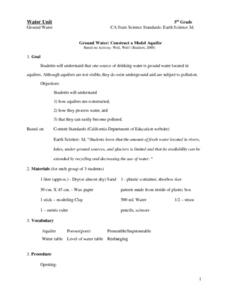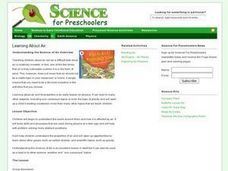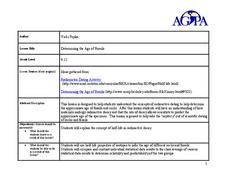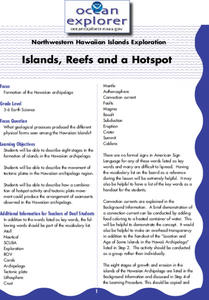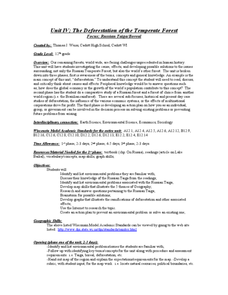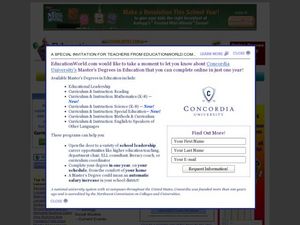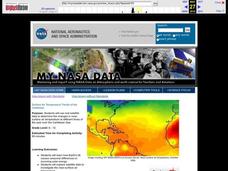Curated OER
Fun with Fossils
Second graders explore the geologic process of fossil formation. In this geology lesson, 2nd graders discuss the job of a paleontologist and make their own model of a fossil. This lesson includes teacher directed questions.
Curated OER
Classification of Clouds
Students view a cloud slide show presentation and identify types of clouds. They estimate height based on cloud's appearance. They discuss the vague nature of cloud nomenclature and compare it to the English standard measurement system.
Curated OER
Ground Water: Construct a Model Aquifer
Students recognize that one source of drinking water is ground water located in aquifers. They create a model of an aquifer and summarize their experience in a report.
Curated OER
The Time of Man
Young scholars demonstrate visually Mankind's relative place on the earth's timeline. They familiarize themselves with the use of the metric system in measuring and producting a timeline.
Curated OER
Roots of the Hawaiian Hotspot
Students explain the processes of plate tectonics and volcanism that resulted in the formation of the Hawaiian Islands. They describe, compare, and contrast S waves and P waves. They explain how
Curated OER
I Can See and Feel the Change in the Seasons
Pupils use their senses to investigate the changes in the seasons. They discuss how the Earth moves around the sun and its tilt. They practice using new vocabulary and examining the different seasons.
Curated OER
Learning about air
Students read a book and have a class discussion about the air around them. In this air lesson plan, students learn about properties of air, and discuss other gases they have observed.
Curated OER
Determining the Age of Fossils
Students examine the concept of radioactive dating. In this radioactive dating lesson, students investigate how to determine the ages of fossils and rocks as they learn about half-life radioactive decay.
Curated OER
Islands, Reefs, and a Hotspot
Students describe eight stages in the formation of islands in the Hawaiian archipelago. They examine the movement of tectonic plates in the Hawaiian archipelago region, and describe how plate movement produced the Hawaiian archipelago.
Curated OER
Mapping Deep-Sea Habitat
Students create a two-dimensional topographic map and a 3-D model of landforms. In this creative activity students create 2 and 3-D objects and learn how to interpret the data from these things.
Curated OER
Graphing Changes in Weather
Students graph current temperature and weather conditions for three days. In this weather instructional activity, students go to the Weather Channel's website and look up weather for their zip code then graph the conditions and...
Curated OER
Climate change in Canada
Students investigate the impact of human activity on the environment. In this secondary math/science lesson, students analyze and interpret information from data and graphs as they investigate trends in climate change and the...
Curated OER
The Deforestation of the Temperate Forest Focus; Russian Taiga/Boreal
Twelfth graders complete a unit of lessons on the Russian Temperate Forest. They list the environmental problems associated with deforestation, conduct research, compare the Russian Taiga with other forests, create graphs, and develop an...
Curated OER
Landforms
Students begin their examination of landforms. Using a map, they locate and identify the major landforms on Earth. They discuss how landforms affect the lifestyle of the community and determine which goods and services the community...
Curated OER
The Six Kingdoms
In this classification worksheet, learners complete a chart listing the characteristics of each of six kingdoms. They write definitions for three terms.
Curated OER
Algal Blooms
For this algal blooms worksheet, students order the stages of a red tide. They answer two short answer questions. Students define three terms relating to algal blooms.
Curated OER
"Little" Brothers Share Big Bond
Students listen to the story Little Brothers Share Big Bond and answer comprehension questions. In this lesson on acceptance, students use various areas of reading (vocabulary, fluency, comprehension) to promote compassion and an...
Curated OER
Mystery of the Alaskan Seamounts
Students study seamounts and the processes that form them. In this Gulf of Alaska lesson plan students interpret data and investigate a hypothesis.
Curated OER
Mass vs. Weight
Students explore physical science by conducting a measurement experiment. In this mass lesson plan, students identify the differences between mass and weight and define a list of other vocabulary terms. Students utilize electronic scales...
Curated OER
Surface Air Temperature Trends of the Caribbean
Pupils investigate the seasonal changes to sea surface and near-surface air temperatures near the equator. They use actual satellite data to track and graph the differences in air and sea temperatures during different seasons in the...
Curated OER
Solar System
Second graders create planet mobiles in order to reinforce concepts such as planet size, position in relation to the sun, and planet names.
Curated OER
Mining Minerals
Learners define the properties of minerals and their uses in their world. In this multi-lesson unit, students contribute actively to discussions of mineral mining, mining methods and mine safety. A role play lesson asks learners to...
Curated OER
Using Radiosonde Data From a Weather Balloon Launch
Student use radiosonde data from a weather balloon launch to distinguish the characteristics of the lower atmosphere. They learn the layers of the atmosphere. They graph real atmospheric data.
Curated OER
Creating Station Models
Learners work in groups to interpret weather maps. They use latitude and longitude readings to complete a worksheet together and turn in the worksheet along with the maps and a rubric.




